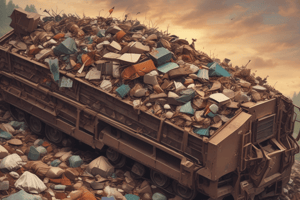Podcast
Questions and Answers
What does solid waste comprise of?
What does solid waste comprise of?
- Only wastes from the urban community
- Only agricultural and industrial wastes
- Wastes arising from human and animal activities that are typically solid (correct)
- Wastes arising from human activities that are both solid and liquid
Why is solid waste disposal a complex problem for a modern industrial society?
Why is solid waste disposal a complex problem for a modern industrial society?
- Many factors make it a problem of huge proportions (correct)
- Limited understanding of solid waste
- Lack of proper disposal facilities
- It is not a complex problem
What environmental damage can improper disposal of solid waste cause?
What environmental damage can improper disposal of solid waste cause?
- Soil contamination, surface water pollution, noise pollution
- Air pollution, soil contamination, surface water and ground water pollution (correct)
- Noise pollution, light pollution, thermal pollution
- Air pollution, light pollution, thermal pollution
How can improper disposal of solid waste affect public health?
How can improper disposal of solid waste affect public health?
What does the text suggest about problems related to solid waste?
What does the text suggest about problems related to solid waste?
Flashcards are hidden until you start studying
Study Notes
Composition of Solid Waste
- Solid waste consists of various materials including organic matter, plastics, metals, paper, glass, textiles, and hazardous substances.
- Municipal solid waste (MSW) encompasses waste generated by households and businesses, while industrial solid waste is generated from manufacturing processes.
Complexity of Solid Waste Disposal
- The rapid growth of urban populations and consumption increases the volume of solid waste generated.
- Diverse waste types complicate disposal methods, requiring different treatments for biodegradables, recyclables, and hazardous materials.
- Limited space for landfills and stricter environmental regulations make it challenging to manage waste effectively.
Environmental Damage from Improper Disposal
- Improper disposal can lead to soil contamination, harming local ecosystems and affecting water sources.
- Methane emissions from decomposing waste in landfills contribute to greenhouse gas accumulation and climate change.
- Littering and illegal dumping can disrupt habitats and negatively impact wildlife.
Public Health Effects of Improper Disposal
- Exposure to hazardous waste can lead to respiratory issues, infections, and chronic diseases in communities near waste disposal sites.
- Contaminated water supplies from leachate can cause gastrointestinal illnesses and other health problems.
- Accumulation of waste can attract pests, which may spread diseases.
Related Problems of Solid Waste
- Current waste management systems often emphasize disposal over reduction and recycling, perpetuating the waste crisis.
- Public awareness and educational initiatives are necessary to foster responsible waste habits among citizens.
- Innovation in waste treatment technologies is essential to mitigate the adverse effects of waste on the environment and public health.
Studying That Suits You
Use AI to generate personalized quizzes and flashcards to suit your learning preferences.





